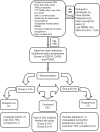Effect of Talbinah food consumption on depressive symptoms among elderly individuals in long term care facilities, randomized clinical trial - PubMed (original) (raw)
Randomized Controlled Trial
Effect of Talbinah food consumption on depressive symptoms among elderly individuals in long term care facilities, randomized clinical trial
Manal M Badrasawi et al. Clin Interv Aging. 2013.
Abstract
Talbinah is a barley syrup cooked with milk and sweetened by honey. In his famous Hadith on Talbinah, the Prophet Mohammad (SAW) recommended it when sad events happen for its effect on soothing hearts and relieving sadness. This 3-week crossover designed, randomized clinical trial was conducted to determine the effect of Talbinah on mood and depression among institutionalized elderly people in Seremban. A sample of 30 depressed elderly subjects (21 men and 9 women) was selected from the long term care facility. Three different interview-based validated scales (Geriatric Depression Scale, Depression Anxiety Stress Scales, and Profile of Mood States) were used to determine mood, depression, stress, and anxiety at week 0, 3, 4, and 7. The nutritional value of Talbinah was examined using proximate food analysis, minerals content analysis, and differential amino acid analysis. The results indicated that Talbinah is a high carbohydrate food (86.4%) and has a high tryptophan: branch chain amino acids ratio (1:2). A Wilcoxon nonparametric test showed that there was a statistically significant decrease on depression, stress, and mood disturbances scores among the intervention group (P < 0.05) for all parameters. In conclusion, Talbinah has the potential to reduce depression and enhance mood among the subjects. Ingestion of functional foods such as Talbinah may provide a mental health benefit to elderly people.
Keywords: Talbinah; cross over study; elderly; food and depression.
Figures
Figure 1
Sampling procedures. Abbreviations: GDS-R, Geriatric Depression Scale-Residential; MMSE, Mini Mental Stat Examination; DASS, Depression, Anxiety and Stress Scale; POMS, Profile of Mood Stat LTC, long term care; GDS-R, geriatric Depression Scale-Residential.
Figure 2
Study design and data collection. Notes: Week 0: Baseline assessment, Week 3: End of period 1, Week 4: End of wash out period, Week 7: End of period 2. GDS-R, DASS, POMS scales were scored at weeks 0, 3, 4, and 7. Nutritional status assessments (weight, height, MUAC, CC, and SGA) were done at weeks 0, 3, 4, and 7. Two-day food-weighing record was done once during each period. Abbreviations: GDS-R, Geriatric Depression Scale-Residential; DASS, Depression Anxiety and Stress Scale; POMS, Profile of Mood States; MUAC, mid upper arm circumference; CC, calf circumference; SGA, subjective global assessment.
Similar articles
- Talbinah (Barley Porridge): neurotransmitters modulatory effect and antidepressant-like action in experimentally depressed rats.
Alamri HS. Alamri HS. Eur Rev Med Pharmacol Sci. 2022 Jan;26(1):204-210. doi: 10.26355/eurrev_202201_27769. Eur Rev Med Pharmacol Sci. 2022. PMID: 35048996 - Effect of bright light and melatonin on cognitive and noncognitive function in elderly residents of group care facilities: a randomized controlled trial.
Riemersma-van der Lek RF, Swaab DF, Twisk J, Hol EM, Hoogendijk WJ, Van Someren EJ. Riemersma-van der Lek RF, et al. JAMA. 2008 Jun 11;299(22):2642-55. doi: 10.1001/jama.299.22.2642. JAMA. 2008. PMID: 18544724 Clinical Trial. - Nurses' and nursing assistants' recognition of depression in elderly who depend on long-term care.
Brühl KG, Luijendijk HJ, Muller MT. Brühl KG, et al. J Am Med Dir Assoc. 2007 Sep;8(7):441-5. doi: 10.1016/j.jamda.2007.05.010. J Am Med Dir Assoc. 2007. PMID: 17845946 Review. - A Systematic Review and Meta-Analysis of B Vitamin Supplementation on Depressive Symptoms, Anxiety, and Stress: Effects on Healthy and 'At-Risk' Individuals.
Young LM, Pipingas A, White DJ, Gauci S, Scholey A. Young LM, et al. Nutrients. 2019 Sep 16;11(9):2232. doi: 10.3390/nu11092232. Nutrients. 2019. PMID: 31527485 Free PMC article.
Cited by
- Honey and Alzheimer's Disease-Current Understanding and Future Prospects.
Shaikh A, Ahmad F, Teoh SL, Kumar J, Yahaya MF. Shaikh A, et al. Antioxidants (Basel). 2023 Feb 9;12(2):427. doi: 10.3390/antiox12020427. Antioxidants (Basel). 2023. PMID: 36829985 Free PMC article. Review. - The effects of dietary tryptophan on affective disorders.
Lindseth G, Helland B, Caspers J. Lindseth G, et al. Arch Psychiatr Nurs. 2015 Apr;29(2):102-7. doi: 10.1016/j.apnu.2014.11.008. Epub 2014 Dec 9. Arch Psychiatr Nurs. 2015. PMID: 25858202 Free PMC article. Clinical Trial. - Knowledge Mapping of Articles on Application of the Quran and Hadiths in Health Care: VOSviewer Visualization Techniques.
Nadi-Ravandi S, Batooli Z. Nadi-Ravandi S, et al. J Relig Health. 2022 Oct;61(5):3940-3968. doi: 10.1007/s10943-022-01562-0. Epub 2022 Apr 29. J Relig Health. 2022. PMID: 35486283 - Innovation in Healthy and Sustainable Food Product Development for Health and Aged Care: A Scoping Review.
Porter J, Cook N, Coorey R, Gunasekera D, Hensher M, Kerr DA, Pollard CM, Yoong S, Dykes G, Lawrence M. Porter J, et al. Foods. 2022 Nov 11;11(22):3604. doi: 10.3390/foods11223604. Foods. 2022. PMID: 36429196 Free PMC article. - Honey on brain health: A promising brain booster.
Zamri NA, Ghani N, Ismail CAN, Zakaria R, Shafin N. Zamri NA, et al. Front Aging Neurosci. 2023 Jan 17;14:1092596. doi: 10.3389/fnagi.2022.1092596. eCollection 2022. Front Aging Neurosci. 2023. PMID: 36733498 Free PMC article. Review.
References
- Luppa M, Luck T, Weyerer S, König HH, Brähler E, Riedel-Heller SG. Prediction of institutionalization in the elderly. A systematic review. Age Ageing. 2010;39(1):31–38. - PubMed
- Blazer DG. Depression and social support in late life: a clear but not obvious relationship. Aging Ment Health. 2005;9(6):497–499. - PubMed
- Prakash O, Gupta LN, Singh VB, Nagarajarao G. Applicability of 15-item Geriatric Depression Scale to detect depression in elderly medical outpatients. Asian J Psychiatr. 2009;2(2):63–65. - PubMed
- Seitz D, Purandare N, Conn D. Prevalence of psychiatric disorders among older adults in long-term care homes: a systematic review. Int Psychogeriatr. 2010;22(7):1025–1039. - PubMed
- Hakkarainen R, Partonen T, Haukka J, Virtamo J, Albanes D, Lönnqvist J. Is low dietary intake of omega-3 fatty acids associated with depression? Am J Psychiatry. 2004;161(3):567–569. - PubMed
Publication types
MeSH terms
LinkOut - more resources
Full Text Sources
Other Literature Sources
Medical

